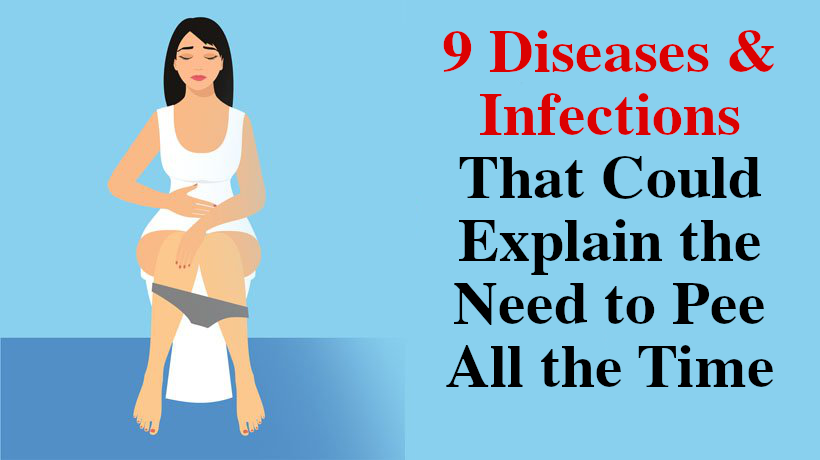Does “the urge” strike you more than usual? Are you constantly running to the bathroom? Urologists, which are doctors that specialize in the urinary system, consider going to the loo more than eight times in 24 hours to be frequent urination. Recurrent trips to the bathroom could be totally normal—or it might be a sign of something more serious.
Here’s how to know…
Urinary tract infection
A urinary tract infection (UTI) is a common cause of frequent urination. You can get a UTI when bacteria enters the bladder through the urethra. It’s estimated that 50 to 60 percent of women will experience at least one UTI in their lives. Women are more at risk for UTIs than men because their urethras are shorter, which means that bacteria have less distance to travel before infection. Common risk factors for a UTI include not staying hydrated, holding your urine too long, vaginal irritation, improper wiping, sexual intercourse, changes in urinary system structure (i.e. pregnancy) and chronic medical problems (i.e. diabetes).
Overactive bladder
An overactive bladder is another common cause of frequent urination. According to the American Urological Association, an estimated 33 million Americans have an overactive bladder. In fact, about 40 percent of all women have overactive bladders. The condition is usually the result of overactive bladder muscles. This can be caused by injuries, conditions affecting muscles, nerves and tissues, estrogen deficiencies and obesity.
Bladder stones
Bladder stones are crystallized minerals that form when concentrated urine hardens in the body. Concentrated urine is usually the result of dehydration or the inability to empty the bladder. This may be due to an enlarged prostate, bladder problems, or urinary tract infections (UTIs). If left untreated, bladder stones can cause infections and further complications.
Diabetes
The frequent need to urinate is a common symptom in women of undiagnosed diabetes. When blood sugar is high, the kidneys can’t process it all, and some can spill into the urine. That sugar will pull more water out of your system, so you tend to generate more pee.
Interstitial cystitis
Interstitial cystitis (IC) is a condition characterized by chronic inflammation of the bladder muscle layers. Symptoms include pelvic and abdominal pain and pressure, frequent urination, an urgency to urinate, accidental leakage of urine. Discomfort can range from a manageable burning sensation to severe pain.
Pelvic floor disorder
Pelvic floor disorder is an umbrella term for different problems that result from a weakened or injured pelvic floor—a group of muscles that supports the various organs of the pelvis, including the bladder and urethra. Pelvic floor disorders that cause frequent urination can have different causes, including childbirth, which can damage the pelvic floor, or aging, which can weaken bladder muscles. The stronger your muscles are down there, the easier it is to hold the urine.
Herniated disk
In some people, a spinal disk’s outer shell grows weak or tears. When this happens, part of the soft inner core bulges out of its normal position, resulting in a herniated disk. If the herniated disk presses on the nearby spinal canal, it can crush the nerves that control the bladder.
Multiple sclerosis
At least 80 percent of people with multiple sclerosis (MS) will experience bladder dysfunction. This occurs when the MS inhibits the transmission of nerve signals in areas of the central nervous system that control the bladder and urinary sphincters. The result might be an overactive bladder that is unable to hold the normal amount of urine or a bladder that does not empty properly.
Uterine fibroids
Uterine fibroids, non-cancerous growths that can grow in and on your uterus, are the most common benign tumors in women of childbearing age. These growths might make it feel like you need to pee all the time. This usually happens when a fibroid becomes too large and puts pressure on your bladder.
Sources:
https://www.healthline.com/health/overactive-bladder/frequent-urination-women
https://www.ncbi.nlm.nih.gov/pmc/articles/PMC3749018/
https://www.healthline.com/health/bladder-stones
https://www.healthline.com/health/diabetes/symptoms-in-women
https://www.healthline.com/health/interstitial-cystitis
https://www.prevention.com/health/a20515824/why-do-i-always-have-to-pee/
https://www.nichd.nih.gov/health/topics/pelvicfloor/conditioninfo/default
https://my.clevelandclinic.org/health/diseases/15533-urination–frequent-urination
https://www.health.harvard.edu/back-pain/herniated-disk-
https://www.nationalmssociety.org/Symptoms-Diagnosis/MS-Symptoms/Bladder-Dysfunction
https://www.niddk.nih.gov/health-information/urologic-diseases/bladder-control-problems/symptoms-causes



